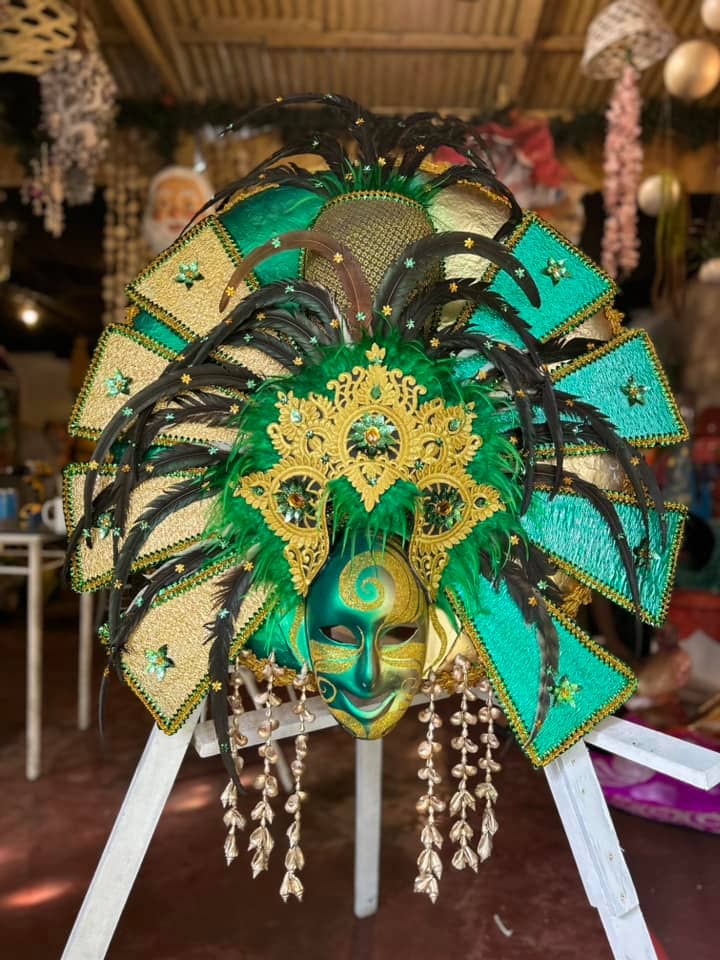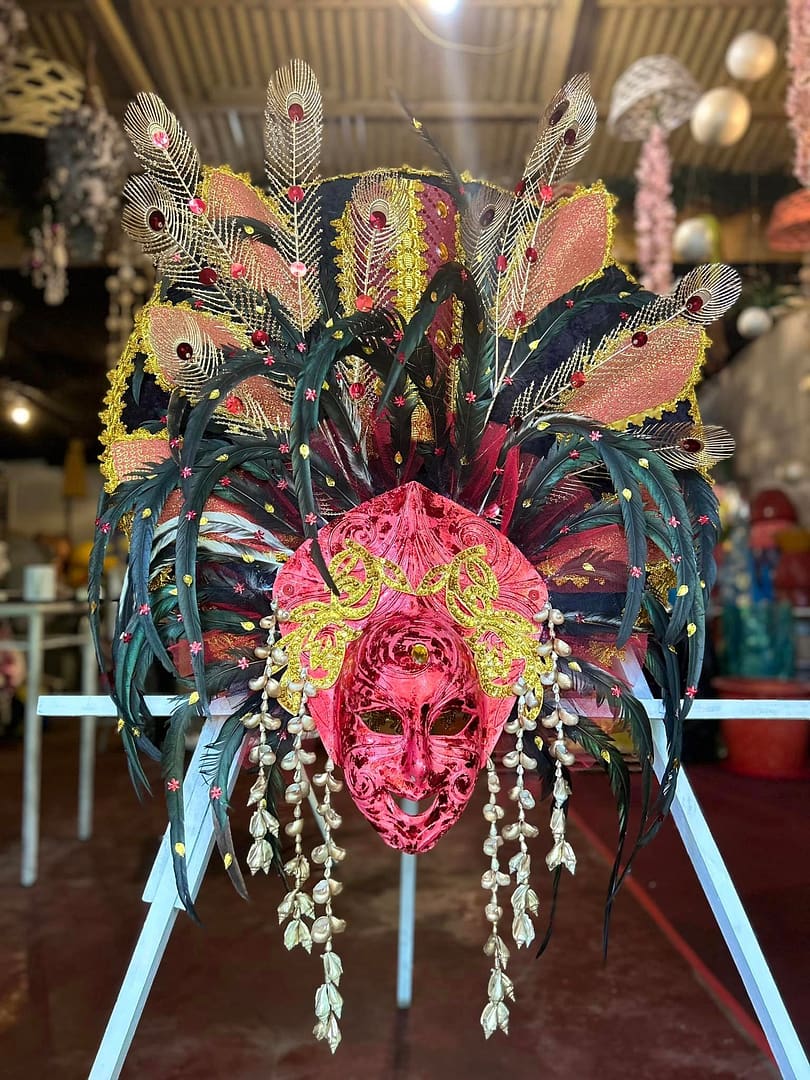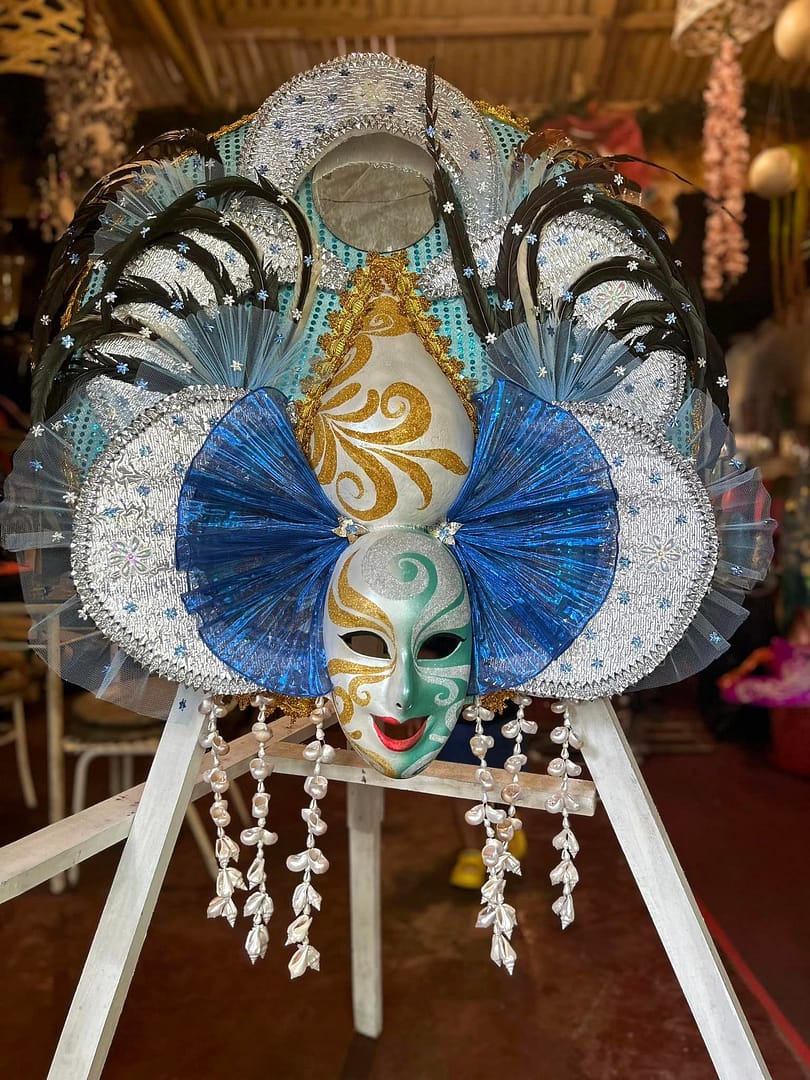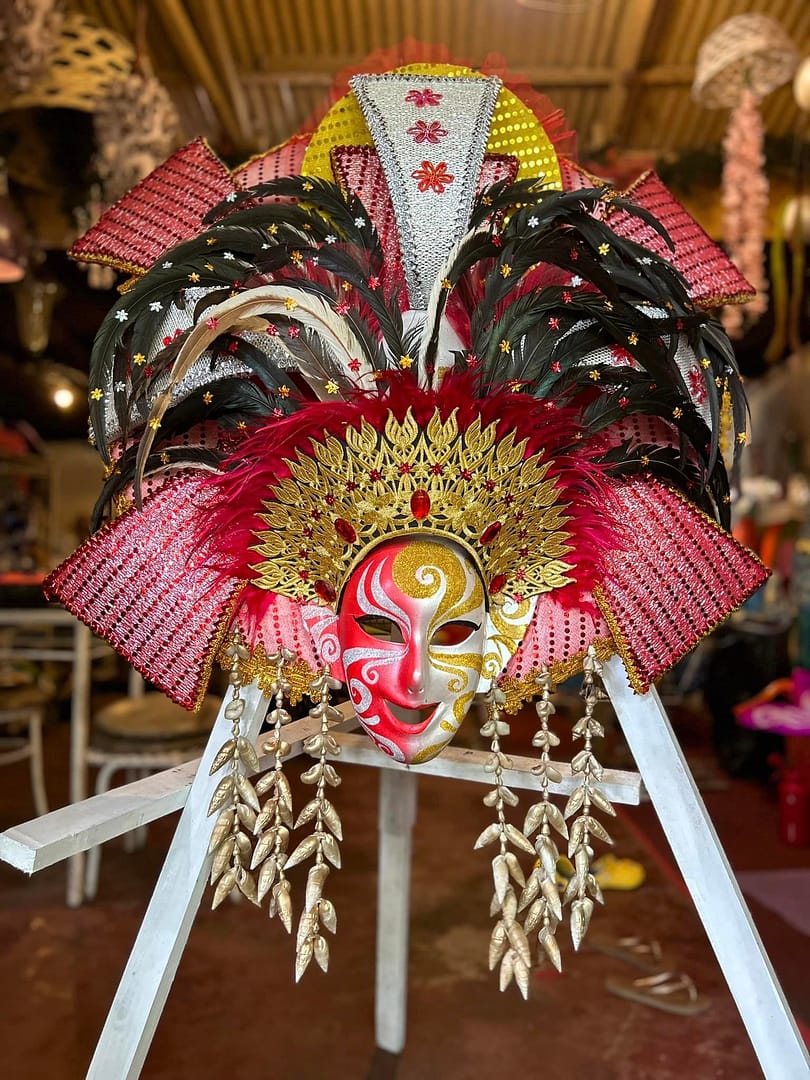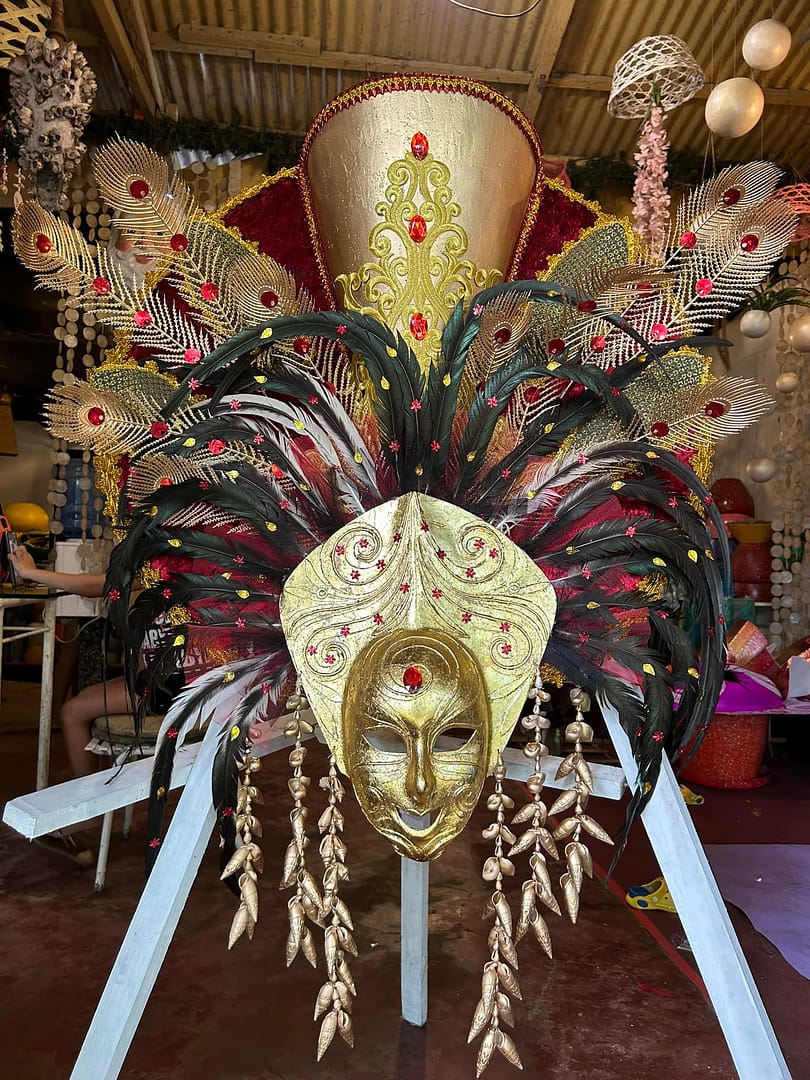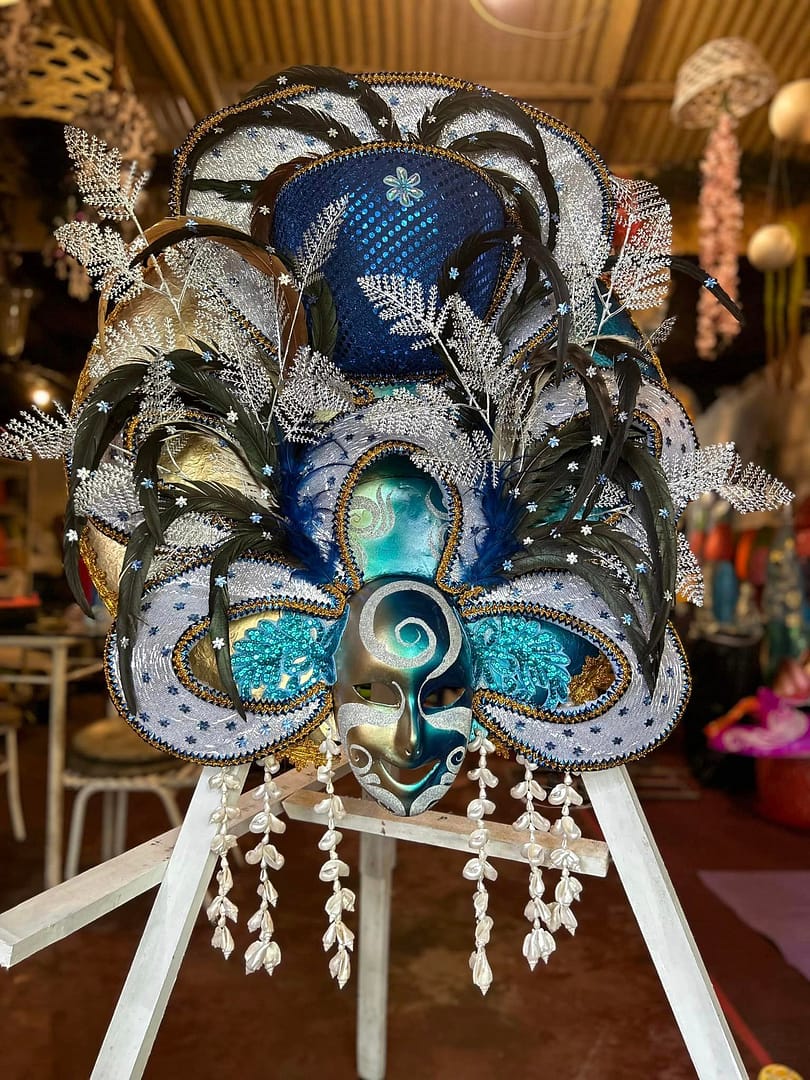Mask Maker
By Mishell M. Malabaguio
Bacolod producer of papier mache masks grows his business with help from the Association of Negros Producers

Desperate to keep his floundering five-year-old printing press business in Bacolod City afloat, Marianito “Jojo” Vito Jr. tried to diversify into several products on top of just accepting printing jobs.
This was in 2005, after a member of the Association of Negros Producers (ANP) invited him to display his products in the city’s ANP Showroom. Vito, then 37, had quickly and absentmindedly accepted the offer although he really had not even one tangible product to display for his company, Papyrus Prints Co. The printing press had been running at a loss and, to make ends meet, Vito had to augment his income by teaching management and entrepreneurship at La Consolacion College in the same city.
With no money at all to invest, all he could think of was to produce paper bags out of his available raw material inventory. Simply to test the market, therefore, he produced 100 pieces of paper bags, printed the label “Bacolod Bacolod” on them, then registered the product under the Vito Prints & Pieces brand.
To his surprise, the paper bags sold out fast at the ANP Showroom. This encouraged him to produce more of them, adding as an extra feature either ceramic tags or tags quoting verses from the Bible. However, although the paper bags remained such a fast-moving item, Vito realized after three months that his income from them could not even pay for just the showroom rentals. The only saving grace for the business was that the ANP did not charge rentals to showroom users for the first two months.
Recalls Vito: “The demand for the product was high but not high enough to cover the overhead costs. This was because I was just selling at P35 to P96 apiece depending on the size, giving me a margin of only 25 percent. Most of this margin just went to the pay of my workers.”
So Vito wracked his brains to come up with something that could be truly profitable. “At that time, kailangan ko na talaga ng totoong product [I needed a real product more than ever], but my problem was that I just didn’t have the money to start with,” he says. All he knew was that he needed a product that he could make given his current meager resources, and one that could best relate to Bacolod City in particular.
Finally, the idea of producing papier mache masks came to him. Vito thought of it because Bacolod City has a 25-year-old annual celebration in October, the MassKara festival, that features weekend-long street dance competitions among colorful masked dancers.
Vito explains why he settled for producing the masks: “The market is really flooded with masks during the MassKara festival, but I just thought that there just might be a market for the masks if I produced them all year round. Of course, I also had the nagging fear that the masks might just turn out to be a seasonal product after all.”
Finally, the idea of producing papier mache masks came to him. Vito thought of it because Bacolod City has a 25-year-old annual celebration in October, the MassKara festival, that features weekend-long street dance competitions among colorful masked dancers.
Nevertheless, Vito toughened himself up and decided to try out his idea. With P5,000 in savings from his day job, he hired an artist to design some masks and made 30 pieces of them from the waste paper in his printing press. He named the masks after himself, Vito, and registered the product under his company, Vito Prints & Pieces. He decided to price them at P350 to P550 per piece and put them on display at the ANP Showroom. Later, he brought the product to Manila by joining ANP’s 2005 National Trade Fair at the Rockwell Mall in Makati City.
His papier mache masks got sold out in no time at all. Soon after, there was a surge of orders for the masks from local and foreign tourists, enabling him to recover his capital after just two months of operation. Vito recalls that the demand for his masks was so high his artist and helper could not longer fill all of the orders.
Indeed, he recalls that there were times when he found it so hard to juggle his time doing three things on a given day: painting the masks himself, managing his printing press and the mask business, and teaching at the university. He says with a laugh: “There were even times when for lack of time, I had to go to class with paint still all over my hands. As an excuse, I would then tell my students, ‘Look, these are the hands that work.'”
Sometime in 2006, Vito started getting orders for his masks from companies for use as corporate giveaways or party costumes. Vito felt that these orders were really for foreign tourists who would bring the masks home abroad. He became very apprehensive that being made of papier mache, the masks might get moist and turn soggy once they are delivered to other countries with climates unlike that of the Philippines. “I really had to do something about the possible problem because the international orders for my masks were getting so huge, and I was afraid of losing those orders,” he recalls.
It was for this reason that Vito decided to shift from paper to fiberglass—a difficult and painful process for Vito because the shift required a much more sizeable investment, training in new production technology, and a bigger production area.
Fortunately for Vito, he became qualified for a loan from the ANP at about that time. He therefore applied for a P50,000 loan and used the proceeds to purchase raw materials, hire more workers, and run a training program for them. He knew nothing about fiberglass at that point, but the fiberglass supplier gave him and his staff training for free on how to use the material.
Because his business had already expanded so much, Vito decided to just focus on the production of the Vito masks. He delegated to his brother, Douglas Vito, the management of Papyrus Prints and the paper bag business. Despite Vito’s busy schedule, however, he continued to teach (and still does) at the university.
Today, the Vito mask has become an all-year-round product that averages 200 pieces per month in sales, with the volume tripling during the month of the MassKara Festival in October. Depending on how elaborate the design, a mask is priced from P350 to P690.
The Vito mask has been doing really brisk business, so Vito was able to pay back his first loan from ANP after only six months. Then, before the end of 2006, he got a bigger loan—P100,000 this time—to finance the expansion of his production area. That same year, the Vito mask was awarded as the ANP Showroom’s seventh top grosser of the year.
From only one artist and a helper, Vito now has two artists, three production assistants, one supervisor, and several subcontractors. Some of these subcontractors came from his printing press; now they and their families are working for the Vito mask business full time.
Even if he has more workers now, Vito still designs all the masks by himself. “I just make one design and then my artist will innovate on it,” he says. “Painting is really my form of expression. I don’t feel tired painting and I don’t mind working overtime at night doing it.”
Also under the Vito brand, he now produces other products and product variations such as mask key chains, clay masks, wooden masks, framed masks, masks with magnets, sculptures, bag jewelries, and fashion accessories. All of these products are being carried by the ANP Showroom, SM City Bacolod, and Gaisano Mall in Bacolod City and by the Market! Market! Mall in Taguig City in Metro Manila. “It was the story of Island Souvenirs that inspired me to expand the business this way, and I’m dreaming of making my company become like Island Souvenirs someday,” he says.
To sustain the market’s interest in the Vito mask, he produces only 20 pieces of each mask design at any one time, and allows several months to pass before making masks of that same design.
Because of the continuing growth of his mask business, Vito is now looking for bigger space for Vito Prints & Pieces. He also plans to explore the use of several other materials for his masks aside from fiberglass. At any rate, he is now gunning to be the ANP Showroom’s second top grosser for 2007, up five notches from his seventh-place finish last year.
“I do think that passion is the key to our success,” Vito says. “I was able to grow Vito Prints & Pieces this big because I have been plowing back my profits into the business and because we really work very hard at it. All of the workers in Vito Prints & Pieces work hard happily and give their best.”
CONTACT DETAILS
JOJO VITO
Vito Prints & Pieces
ANP Showroom, Lourdes-C Bldg., 9th St. cor. Lacson St.
Bacolod City, Negros Occidental
Mobile: 0918-9302556
Fax: (034) 433-5965
E-mail:jovito_intraspec@yahoo.com











